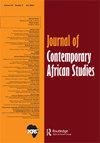尼日利亚政党融资和选举费用的问题与法规(1999-2020年)
IF 0.8
Q2 AREA STUDIES
引用次数: 0
摘要
摘要政党运作需要强大的资金支持。竞选活动需要大量支出来说服选民接受所在地政党的候选人资格。然而,尼日利亚有关于如何开展运动和相关活动的财务条例。这是为了确保透明度和问责制,避免选举过程中的腐败行为。然而,尽管有这些宪法规定和《2010年尼日利亚选举法》的规定,似乎仍存在违反财务规定和处罚执行不力的情况。因此,本文审查了尼日利亚政党融资的规定以及确保遵守规定所需的措施。这项工作采用了一种特殊的定性数据收集和分析方法。它使用一级(从机构获得)和二级(政府文件和法律)数据。该文件的结论是,尽管尼日利亚对政党融资有明确的规定,但其实施、监督和执行以及对罪犯的制裁仍然非常薄弱。因此,该文件建议政策制定者、全国独立选举委员会和民间社会需要确保遵守。本文章由计算机程序翻译,如有差异,请以英文原文为准。
Issues and regulations in party financing and electoral expenses in Nigeria (1999–2020)
ABSTRACT Political parties require strong financial backing to operate. Campaign activities require massive spending to convince electorates to accept the candidature of political parties in their locations. Yet, there are financial regulations on how campaigns and related activities should be conducted in Nigeria. This is to ensure transparency and accountability and eschew corrupt practices in the electoral process. However, despite these constitutional regulations and the provision of the Nigerian Electoral Act 2010, there seem to be cases of violations of financial regulations and weak enforcement of penalties. Thus, this paper examines the regulations in political party financing in Nigeria and the measures needed to ensure compliance. The work adopted a particularistic qualitative method of data collection and analysis. It uses primary (obtained from agencies) and secondary (government’s document and laws) data. The paper concludes that, while there are well-articulated regulations on political party financing in Nigeria, their implementation, monitoring, and enforcement, as well as the sanction of offenders remain very weak. The paper, therefore, recommends that policy makers, the Independent National Electoral Commission (INEC) and civil societies need to ensure compliance.
求助全文
通过发布文献求助,成功后即可免费获取论文全文。
去求助
来源期刊

Journal of Contemporary African Studies
AREA STUDIES-
CiteScore
2.20
自引率
0.00%
发文量
18
期刊介绍:
Journal of Contemporary African Studies (JCAS) is an interdisciplinary journal seeking to promote an African-centred scholarly understanding of societies on the continent and their location within the global political economy. Its scope extends across a wide range of social science and humanities disciplines with topics covered including, but not limited to, culture, development, education, environmental questions, gender, government, labour, land, leadership, political economy politics, social movements, sociology of knowledge and welfare. JCAS welcomes contributions reviewing general trends in the academic literature with a specific focus on debates and developments in Africa as part of a broader aim of contributing towards the development of viable communities of African scholarship. The journal publishes original research articles, book reviews, notes from the field, debates, research reports and occasional review essays. It also publishes special issues and welcomes proposals for new topics. JCAS is published four times a year, in January, April, July and October.
 求助内容:
求助内容: 应助结果提醒方式:
应助结果提醒方式:


